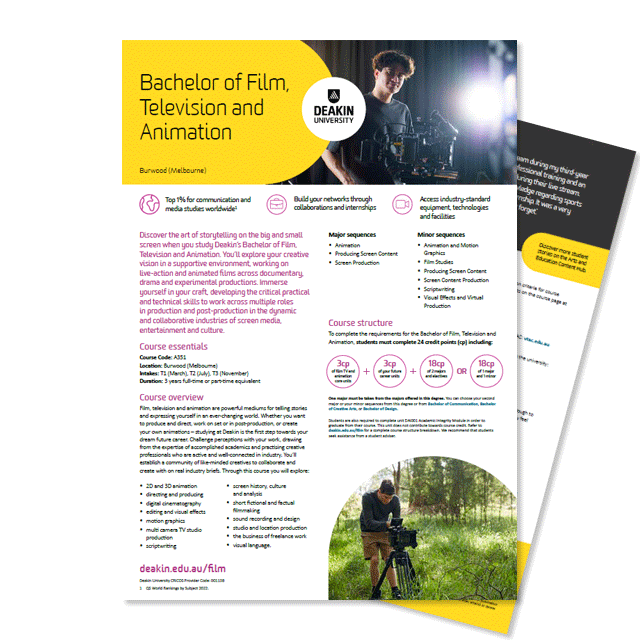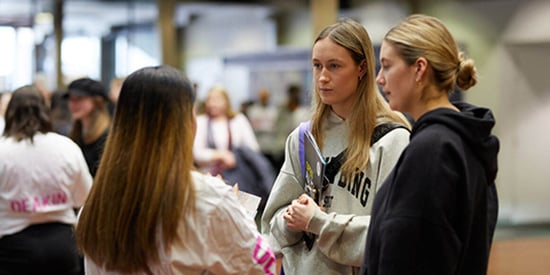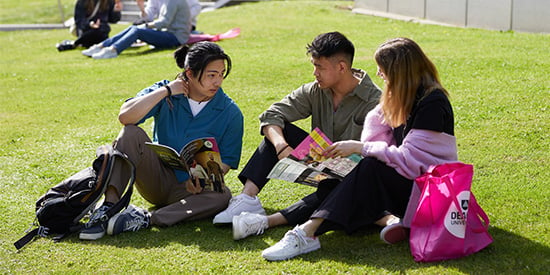Work on industry briefs with real-life clients
Use industry-standard equipment in our TV studio
Gain experience and build networks through internships
Key facts
Key dates
Direct applications to Deakin for Trimester 2 2024 close 23 June 2024
Direct applications to Deakin for Trimester 3 2024 close 27 October 2024
Current Deakin Students
To access your official course details for the year you started your degree, please visit the handbook
Course overview
The Bachelor of Film, Television and Animation at Deakin University provides a hands-on education using state of the art technology within an inspiring creative arts environment. Deakin Film & Television students have the flexibility to be multi-skilled and to create their own specialist skill-sets within the broad and dynamic fields of screen production and screen culture. The course includes units in studio and location production, film analysis, specific creative crafts and screen careers alongside overseas study tours and opportunities for internships with leading production companies.
Film, television and animation are multidisciplinary creative forms, so this course also provides access to the theory and practice of other creative arts including photography, 3-D animation and motion capture, drama, dance, visual arts and visual communication design. You can further tailor your own set of skills and knowledge by taking elective units from across the University.
The major discipline of film, television and animation focuses on the development of the creative and analytic skills required for successful, professional and artistic practice. The degree comprises study in many areas including short narrative and animation filmmaking, documentary and experimental forms, team and project management, visual language, digital cinematography and editing, sound design, production design, scriptwriting and project development, directing and high definition broadcast TV studio production.
In Deakin Film, Television and Animation, you will be exposed to a range of historical, theoretical and critical approaches to the production, reception and analysis of global screen culture.
The course will prepare you for the changing opportunities and challenges of the media and creative industries by allowing cross-discipline collaboration, multi-skilling, internships, international study, and study in professional practice and entrepreneurship. The program draws upon the expertise of its academic staff (who are active in screen production themselves) together with special guests from industry.
Read MoreCourse information
- Award granted
- Bachelor of Film, Television and Animation
- Year
- 2018 course information
- Deakin code
- A351
- CRICOS code?
- 095258K Burwood (Melbourne)
- Approval status
- This course is approved by the University under the Higher Education Standards Framework.
- Australian Qualifications Framework (AQF) recognition
The award conferred upon completion is recognised in the Australian Qualifications Framework at Level 7.
Course structure
To qualify for the award of Bachelor of Film, Television and Animation a student must complete 24 credit points including:
- 18 credit points of compulsory core units
- 6 credit points of electives
- no more than 12 credit points at level 1
- AAI018 Academic Integrity (0-credit-point compulsory unit)
Complete four 1-credit point units chosen from the following list:
Complete three 1-credit point units chosen from the following list:
Electives
Complete six electives, of which at least two must be 2nd or 3rd level
We suggest students complete at least 4 units in a subject area different to their degree, preferably a linked sequence of study in the same area. Students with a strong interest in animation should add units in 3-D Animation, Motion and similar units in the Bachelor of Design. More generally your best choices are often found in the subject areas of the Bachelor of Arts. Additional selectable core units can be taken as electives.
Level 2
Level 3
Level 1
Intakes by location
The availability of a course varies across locations and intakes. This means that a course offered in Trimester 1 may not be offered in the same location for Trimester 2 or 3. Check each intake for up-to-date information on when and where you can commence your studies.
Deakin splits the academic year into three terms, known as trimesters. Most students usually undertake two trimesters each year (March-June, July-November).
Additional course information
Assessment
Assessment within the award of Bachelor of Creative Arts varies from written assignments and/or examination to practical and technical exercises and performance. In some units assessment may also include class participation, online exercises, seminar exercises and tests.
Course duration - additional information
Course duration may be affected by delays in completing course requirements, such as accessing or completing work placements.
Mandatory student checks
Any unit which contains work integrated learning, a community placement or interaction with the community may require a police check, Working with Children Check or other check.
Participation requirements
Reasonable adjustments to participation and other course requirements will be made for students with a disability. Click here for more information.
Work experience
Elective units may provide the opportunity for Work Integrated Learning experiences.
Need help?
Ask a question about studying at Deakin
Entry requirements
Scholarship options
A Deakin scholarship could help you pay for your course fees, living costs and study materials. If you've got something special to offer Deakin - or maybe you just need a bit of extra support - we've got a scholarship opportunity for you. Search or browse through our scholarships
Apply now
Applications for Trimester 1, 2025 open in August. Each year, thousands of students prepare for uni with the help of Deakin support services. We offer a huge range of support, including one-on-one consultations, webinars, online resources and events throughout the year.
Some of our courses have limited places available - for the latest on courses still open for application, visit Courses by trimester.
Create an account in the Deakin Application Portal, start your application, enter personal details, education experience, upload supporting documents and submit. Need help? Play this video, or contact one of our friendly future student advisers on 1800 693 888 or submit an online enquiry.
You can apply for this course through the Indigenous Access Scheme, which recognises the achievements of Aboriginal and Torres Strait Islander students and considers the skills, experience and community work that prepares you for study. We look beyond your ATAR and academic results so we can reward your hard work with a place at university.
Entry pathways
View pathways into the Bachelor of Film, Television and Animation with our pathways finder.
Contact information
Arts and Education Student Services and Enrolment Enquiries
Burwood (Melbourne)
Tel 03 9246 8100
artsed@deakin.edu.au
Careers
Want a degree that’s more than just a qualification? Our industry connections, world-class facilities and practical approach to learning are just some of the reasons why Deakin students graduate confident and ready to thrive in the jobs of tomorrow.
Career outcomes
As a graduate of the Bachelor of Film, Television and Animation you will be readily equipped with skills appropriate to the expanding film, television, digital media and allied communication and entertainment industries. Graduates may find employment in fictional and factual production for cinema and television and in the corporate, educational, music video and advertising sectors. You may establish your own business in these fields, work as a freelance producer, director and script writer or as a highly skilled crew member in the animation, camera, lighting, sound, production design and editing departments. You may also find work with broadcast TV stations, facility and post-production houses or in distribution, exhibition, archiving, research, screen education and cultural entrepreneurship. Graduates have launched their careers with national awards and international recognition (through film festivals) for their student work. Deakin’s internship program, industry traineeships and scholarships have also provided a start to successful careers in the field.
Graduates acquire a range of knowledge and skill beyond those specific to film, animation and television or the creative arts. These include theoretical knowledge and extensive practical experience in teamwork, research, writing, project development and management and public presentation.
For more information go to DeakinTALENT
Course learning outcomes
Deakin's graduate learning outcomes describe the knowledge and capabilities graduates can demonstrate at the completion of their course. These outcomes mean that regardless of the Deakin course you undertake, you can rest assured your degree will teach you the skills and professional attributes that employers value. They'll set you up to learn and work effectively in the future.
| Deakin Graduate Learning Outcomes | Course Learning Outcomes |
| Discipline specific knowledge and capabilities | Demonstrate the knowledge and skills to:
|
| Communication | Effectively communicate the intent, design approaches and ideas in creative work through written, oral and digital form to a range of audiences. |
| Digital literacy | Evaluate requirements for, make recommendations in relation to, and use high level digital film, television and animation production technologies to create film and television products to be distributed through a range of digital platforms. |
| Critical thinking | Develop, research and evaluate ideas, concepts and processes for making film, television and animation productions, through creative, critical and reflective thinking and practice. |
| Problem solving | Apply narrative, aesthetic, technical, logistical, organisational, critical and interpersonal skills and knowledge to produce film, television and animation productions. |
| Self-management | Demonstrate autonomy, initiative and responsibility, an ability to self-evaluate and manage time and resources to fulfil the obligation of working in a collaborative environment and to identify, evaluate and research project needs and solutions as a reflective practitioner. |
| Teamwork | Demonstrate the ability to work in different capacities in a range of production team models in film, television and animation production. |
| Global citizenship | Demonstrate an awareness of cultural and social diversity and issues of globalisation in film, television and animation. |
| Approved by Faculty Board January 2017 | |
Events Explore more events
Footnotes
*QS Stars University Ratings 2016–2017





